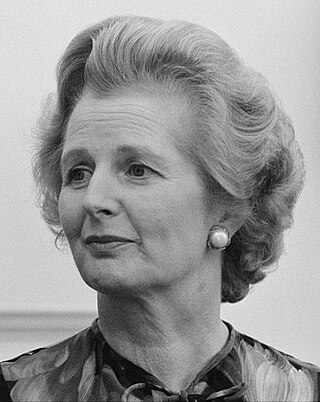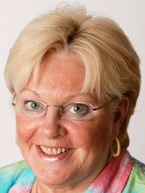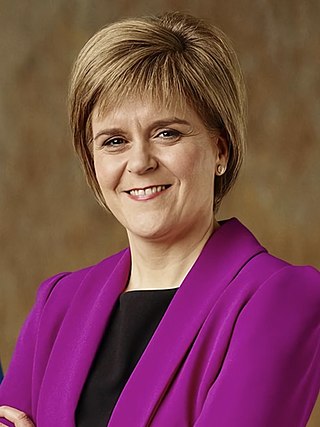
The 1979 United Kingdom general election was held on Thursday 3 May 1979 to elect 635 members to the House of Commons. The election was held following the defeat of the Labour government in a no-confidence motion on 28 March 1979, six months before the Parliament was due for dissolution in October 1979.

The politics of Scotland operate within the constitution of the United Kingdom, of which Scotland is a country. Scotland is a democracy, being represented in both the Scottish Parliament and the Parliament of the United Kingdom since the Scotland Act 1998. Most executive power is exercised by the Scottish Government, led by the First Minister of Scotland, the head of government in a multi-party system. The judiciary of Scotland, dealing with Scots law, is independent of the legislature and the Scottish Government. Scots law is primarily determined by the Scottish Parliament. The Scottish Government shares some executive powers with the Scotland Office, a British government department led by the Secretary of State for Scotland.
The Labour Party of Scotland was a minor Scottish nationalist political party that was active in the early 1970s. Formed as a left-wing breakaway from Dundee's branch of the Scottish National Party (SNP), it is perhaps best known for standing in the Dundee East by-election of 1973, where its interference split the nationalist vote and probably cost the SNP a parliamentary seat as a result. The party contested elections to Dundee City Council two months later but was ultimately unsuccessful. It folded soon after, and by early 1974 most of its membership had returned to the SNP, whose campaigns on North Sea oil were proving popular with Scotland's urban electorate. It never had any official political representation.
A Red Tory is an adherent of a centre-right or paternalistic-conservative political philosophy derived from the Tory tradition. It is most predominant in Canada; however, it is also found in the United Kingdom, where it is more commonly known as one nation conservatism. This philosophy tends to favour communitarian social policies, while maintaining a degree of fiscal discipline and a respect of social and political order. It is contrasted with "Blue Tory" or "High Tory". Some Red Tories view themselves as small-c conservatives.
In Scotland, the Scottish National Party (SNP) is a left social democratic political party which campaigns for Scottish independence. The SNP has controlled Scotland's devolved legislature since the 2007 election as a minority government, and were a majority government from the 2011 election and have been a minority government, since the 2016 election.

East Dunbartonshire was a county constituency of the House of Commons of the Parliament of the United Kingdom (Westminster). It elected one Member of Parliament (MP) by the first past the post system of election. The seat is possibly best known for formerly being the constituency of Jo Swinson, the former Leader of the Liberal Democrats who was defeated at the 2019 general election.
The Hamilton by-election in Hamilton, Lanarkshire, Scotland, was held on 2 November 1967. It was called after the former Labour MP, Tom Fraser, resigned in order to take up the position as head of the North of Scotland Hydro-Electric Board. The constituency had been a safe seat for Labour, who had taken over two-thirds of the vote there in every general election from 1945 to 1966, when only the Conservatives had stood against them.
Politics in the Dundee Citycouncil area are evident in the deliberations and decisions of Dundee City Council, in elections to the council, and in elections to the Scottish Parliament (Holyrood) and the House of Commons of the Parliament of the United Kingdom (Westminster).

The Glasgow Govan by-election was held on 8 November 1973, following the death of John Rankin, Labour Party Member of Parliament for the Glasgow Govan constituency. Rankin had died one month earlier, on 8 October 1973. Rankin had held the seat since 1955. With the exception of a narrow Conservative victory in 1950, the seat had been solidly Labour-held since 1918. For the by-election the Labour Party nominated Harry Selby, a veteran activist in Glasgow and a former Trotskyist. It was later reported that Selby's selection had been controversial with some Labour members who felt that at the age of 61 he was too old to be starting a parliamentary career.

The 2011 Scottish Parliament election was held on Thursday, 5 May 2011 to elect 129 members to the Scottish Parliament.

A Glasgow Hillhead by-election was held on 25 March 1982. The by-election was caused by the death of the Conservative Party Member of Parliament for Glasgow Hillhead Tam Galbraith on 2 January 1982.
The 1978 Berwick and East Lothian by-election was a by-election held for the House of Commons constituency of Berwick and East Lothian in Scotland on 26 October 1978. It was one of two UK parliamentary by-elections held on that day, and was won by the Labour Party candidate John Home Robertson.
There was a by-election for Dundee East, in Scotland, on 1 March 1973. It was one of three UK parliamentary by-elections held on that day. It was caused by the appointment of George Thomson as a European commissioner. George Machin retained the seat for Labour, but only narrowly. There was a strong showing by the Scottish National Party, which prefigured their serious breakthrough at the Govan by-election later in the year, and the two general elections of 1974.
The 1969 Glasgow Gorbals by-election was a parliamentary by-election held on 30 October 1969 for the House of Commons constituency of Glasgow Gorbals in Glasgow. It was one of five UK parliamentary by-elections held on that day.

The Glasgow Pollok by-election of 9 March 1967 was held after the death of Labour MP (MP) Alex Garrow:

A general election was held in the United Kingdom on 7 May 2015 and all 59 seats in Scotland were contested under the first-past-the-post, single-member district electoral system. Unlike the 2010 general election, where no seats changed party, the Scottish National Party (SNP) won all but three seats in an unprecedented landslide victory. The SNP received what remains the largest number of votes gained by a single political party in a United Kingdom general election in Scotland in British history, breaking the previous record set by the Labour Party in 1964 and taking the largest share of the Scottish vote in sixty years, at approximately 50 per cent.
Elections for the City of Glasgow District Council took place on 3 May 1977, alongside elections to the councils of Scotland's various other districts. These were the second elections to the City of Glasgow District Council, and saw Labour losing their control of the council, losing nearly half of their councillors. Among the losing councillors was Dick Dynes, the Labour group leader. Dynes was replaced as leader by Jean McFadden.
The 1980 City of Glasgow District Council election took place on 1 May 1980, alongside elections to the councils of Scotland's various other districts. This was the third election to the City of Glasgow District Council.

A general election was held in the United Kingdom on Thursday, 11 June 1987 and all 72 seats in Scotland were contested.








